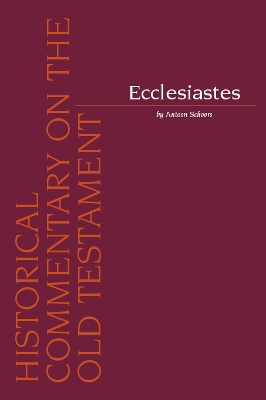Historical Commentary on the Old Testament
1 primary work
Volume 0
Ecclesiastes, Qoheleth in Hebrew, is a fascinating book. It was written
in the Hellenistic Period (3rd-2nd Cent. B.C.) and is one of the latest
books in the Old Testament. The author is in search of an answer to the
problem he poses in 1:3, "What profit is there for humans from all their
toil at which they toil under the sun?". The answer is: "None".
Therefore, Ecclesiastes begins and ends his book with a statement that
everything is absurd. He does not try to explain away this reality, but
he presents enjoyment of life as the best, though not the perfect,
solution. He has been called an atheist, a pessimist, a sceptic, an
Epicurean, but also an optimist, a believing or god-fearing man. He is
certainly a nonconformist, and the best characterization is that he is a
sceptic or even an agnostic, who undermines all sorts of certainties. He
asks many questions but gives few answers. But all this is meant for the
best: he speaks honestly with a feeling of compassion with tormented
humankind. His book often sounds very modern.
in the Hellenistic Period (3rd-2nd Cent. B.C.) and is one of the latest
books in the Old Testament. The author is in search of an answer to the
problem he poses in 1:3, "What profit is there for humans from all their
toil at which they toil under the sun?". The answer is: "None".
Therefore, Ecclesiastes begins and ends his book with a statement that
everything is absurd. He does not try to explain away this reality, but
he presents enjoyment of life as the best, though not the perfect,
solution. He has been called an atheist, a pessimist, a sceptic, an
Epicurean, but also an optimist, a believing or god-fearing man. He is
certainly a nonconformist, and the best characterization is that he is a
sceptic or even an agnostic, who undermines all sorts of certainties. He
asks many questions but gives few answers. But all this is meant for the
best: he speaks honestly with a feeling of compassion with tormented
humankind. His book often sounds very modern.
